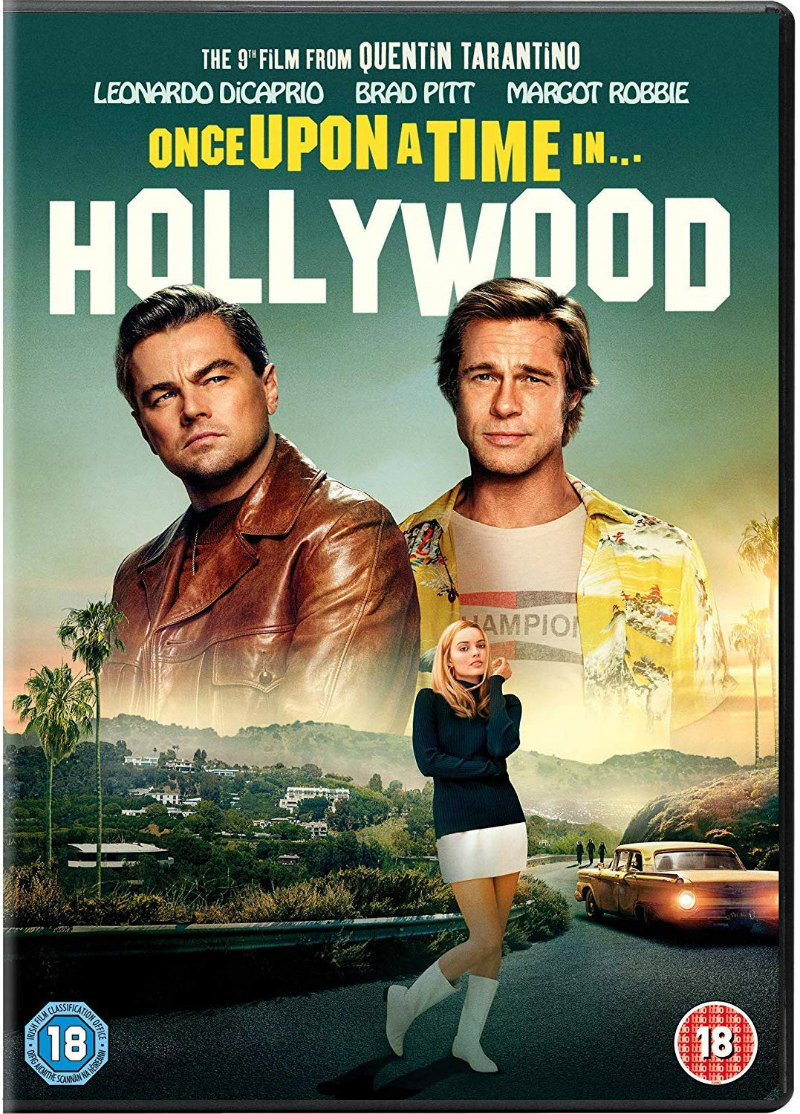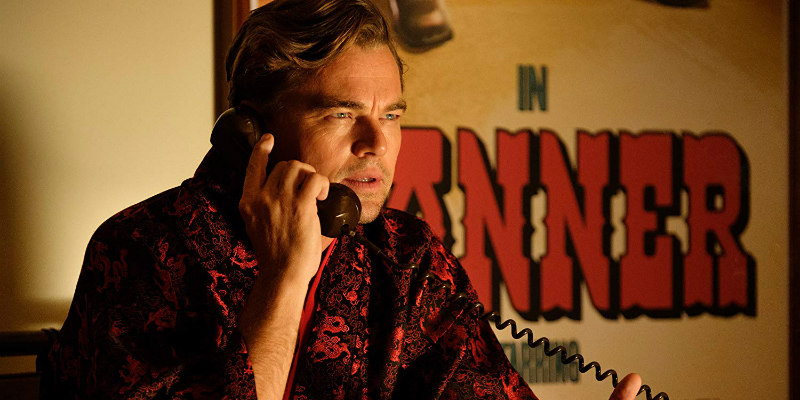
Review by
Eric Hillis
Directed by: Quentin Tarantino
Starring: Leonardo DiCaprio, Brad Pitt, Margot Robbie, Al
Pacino, Kurt Russell, Luke Perry, Timothy Olyphant, Dakota
Fanning, Margaret Qualley, Austin Butler, Maya Hawke, Mike Moh, Emile
Hirsch, Bruce Dern, Julia Butters

Alfred Hitchcock once reductively described drama as "Life with the dull bits cut out." One person's dull bits, however, are another's bombastic action set-piece. For me, watching Brad Pitt, Leonardo DiCaprio and Margot Robbie casually drive around the quake-cracked tarmac of an immaculate recreation of 1969 Los Angeles in Quentin Tarantino's Once Upon a Time in Hollywood is infinitely more exhilarating than any of the overblown CG car chases of the Fast & Furious franchise. Once Upon a Time in Hollywood is almost devoid of plot, instead allowing us to simply hang out with its characters and lounge in the glorious mundanity of their existence. It ends, as you might expect, in an explosion of violence, but up to that point we're left to simply watch three people at various stages of their Hollywood careers go about their daily business in a pop culture ephemera laden world. It's a gift to anyone who ever found themselves pausing an episode of The Rockford Files to read the label on the cheap beer James Garner chugs in his trailer home.
The movie begins in February of 1969. Actress Sharon Tate (Margot Robbie) is on top of the world. Her acting career is taking off and her husband, Roman Polanski, is the most respected of a new breed of young filmmakers, fresh off the success of Rosemary's Baby.

Tate's next door neighbour, Rick Dalton (DiCaprio), is at the opposite end of his career trajectory. Once the star of a hit western TV show, 'Bounty Law', the forty-something Dalton is in danger of becoming a has-been. Like so many actors who quit TV shows at the height of their fame, the movie career Dalton envisaged failed to pan out, leaving him to eke out a living in villain of the week roles on a variety of small screen series.
Dalton's rock is Cliff Booth (Pitt), his long-serving stunt double, now more often doubling as his driver, thanks to Dalton's habit of drink driving, and his general man Friday, performing odd jobs like fixing the actor's TV aerial.
Around two thirds of the way through the movie we skip forward six months to August 8th, 1969, a sadly significant date in Hollywood history, but before then we spend a far more leisurely day in February in the separate company of the aforementioned three characters.
[ READ MORE: New Release Review - Son ]
Tate's day consists of dancing to records before driving downtown for a spot of shopping. Noticing that her latest movie, the Dean Martin spy caper The Wrecking Crew, is playing at a cinema across the street, Tate decides to check it out with an audience.
A hungover Dalton finds himself on the set of yet another network show, in this case the largely forgotten western Lancer. An adorable encounter with a precocious child performer (Julia Butters) gives him a new lease of life.
Picking up a sexually provocative teenage hippy (Margaret Qualley), Booth is surprised when she asks him to drive her to the Spahn ranch, once the setting for numerous westerns, some of which Booth worked on, and now home to a commune led by a man named Charlie.

Few working filmmakers divide audiences quite like Tarantino, and his haters have various reasons to dislike his work, from the political (his use of the N-word and his treatment of women) to the artistic (the superficiality of his movies and his propensity for the verbose over the visual). One of the things that annoys me most about Tarantino is his repurposing of songs and music cues associated with existing movies, which feels like a lazy attempt to replicate the emotion they generated in other filmmakers' work. Take his needle drop of The Rolling Stones' 'Out of Time' here, its lyrics commenting on the predicament Dalton believes himself to be in. Tarantino uses the song in exactly the same manner as Hal Ashby did over the opening credits of 1978's Coming Home. a movie that like Once Upon a Time in Hollywood, is set in 1969 and deals with a middle-aged man (Bruce Dern, who cameos here as George Spahn) finding himself irrelevant in a world he no longer recognises.
More intriguing is Tarantino's reconstitution here of composer Bernard Herrmann's rejected score for Hitchcock's Torn Curtain. Like Dalton, Herrmann found himself cast aside in the late '60s when Hitchcock complained that his music didn't sound modern enough. A few years later, three members of the new breed of Hollywood filmmakers (Larry Cohen, Brian de Palma and Martin Scorsese) would resurrect Herrmann's career.
[ READ MORE: New Release Review - Lapsis ]
That's the theme of Tarantino's latest - a bridging of the generation gap, which in 2019, with 'boomer' and 'millenial' so regularly wielded as slurs, appears wider than ever. Dalton is terrified of youth, which he sees through the prism of his own flagging career, but in the film's two most touching moments he's embraced and accepted into the youthful new world he longs to be a part of.
Booth, on the other hand, merely despises the younger generation, which he views with immense suspicion. When he finds the elderly George Spahn sleeping after having sex with a teenage girl (Dakota Fanning), he worries not for the well being of the girl but for Spahn, like if De Niro had decided to kill Jodie Foster to protect Harvey Keitel in Taxi Driver. He hates youth as much as Ethan Edwards hates the Comanche in The Searchers (or as much as Tarantino hates John Ford, the clown). Encountering Bruce Lee (Mike Moh) while doubling for Dalton on an episode of The Green Hornet, Booth purposely needles the martial artist into a fight. Compare this to the glimpse we get of Lee training Tate on the set of The Wrecking Crew, the two youngsters laughing and smiling together. For Tate, Lee is someone to learn from. For Booth, he's merely a threat that needs to be extinguished. Booth is a hammer, and in his line of work in 1969, there's no bigger nail than Bruce Lee.

Once Upon a Time in Hollywood has much in common with S Craig Zahler's Dragged Across Concrete. Both movies take a lot of time to focus on minutiae, and both feature an awful lot of driving. But crucially, both are about middle-aged white guys who have been given multiple chances to succeed yet can't see themselves as anything other than victims of a changing world rubbing up against something close to pure evil. The key difference is that Zahler sees no hope for his protagonists, whereas Tarantino is far more generous towards Dalton and Booth. They might be assholes who need to take stock of the fact that their lack of youth is what's keeping them from dying in Vietnam, and Booth may actually have murdered his wife (an ambiguous flashback allows the viewer to add their own prejudice regarding his guilt), but their friendship is nonetheless endearing because it feels so genuine. Dicaprio and Pitt are so at ease together that you'd be forgiven for thinking they had collaborated as regularly as John Wayne and Walter Brennan, yet remarkably, this is the first time the two megastars have ever shared the screen.
Once Upon a Time in Hollywood might be set in filmmaking ground zero, but unlike most of Tarantino's work, it's about something other than simply movies. It's about generations reaching out and working together, the young and the old accepting they have a lot to learn from one another. Hopefully it might make some young people watch some old movies, and some old people some new movies.

Once Upon a Time in Hollywood is on
Netflix UK/ROI now.
